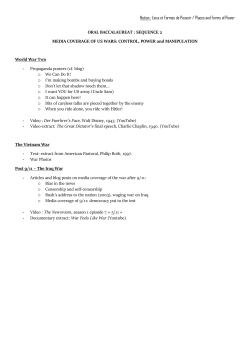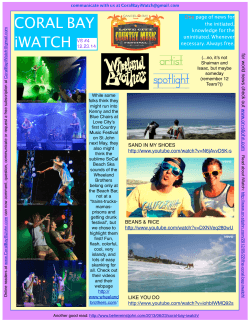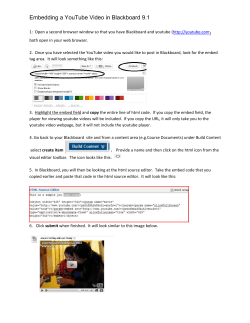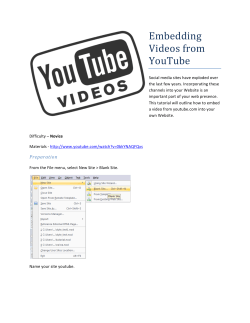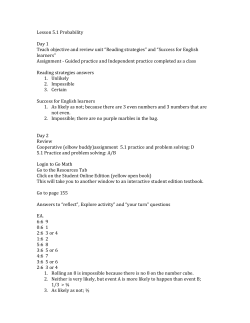
TECHNICAL REPORT To be or not to be real? Investigating
TECHNICALREPORT Published 19th April 2013 Helsinki Institute for Information Technology HIIT, Aalto University, Finland Lassi A. Liikkanen & Tuukka Sandström Tobeornottobereal? InvestigatingtheauthenticityofYouTubeviews Keywords: media culture; music consumption; digital music; fan culture; YouTube views; fake views detection; black hat hacking Summary: Our research team recently commented on a debate concerning the authenticity of YouTube views (http://www.hs.fi/paivanlehti/kulttuuri/Tutkija+Frontside+Ollien+suosio+on+aitoa/a1365570798639; Helsingin Sanomat 11.5.2013, p. C3). In a Finnish blog, a music business insider was accusing that the views for the most popular YouTube music video of 2012 in Finland had been manipulated (http://www.villetolvanen.com/2013/04/09/tuukka‐temonen‐kuka‐puhalsi‐frontside‐ollien/ ). In this article, we provide some evidence in the support of the null hypothesis that the views are authentic. We found several reasons to believe that the considerable number of views for the video in questions were produced by real people. This is a probabilistic estimate, as we are very certain about the assessment, but we can never completely rule out the possibility of some manipulation. In the following description of research methods and results, we draw from three types of data: popularity outside YouTube, YouTube statistics, and indicators of user interaction with the service. We conclude by discussing the sudden cultural significance of YouTube for music consumption CaseFrontsideOllie This report is about the music video of Frontside Ollie by Robin uploaded to YouTube on 13th of Jan 2012. It is the most popular music video sang in Finnish to appear in YouTube by early 2013. It has accumulated over 10 million views. Figure 1. Screenshot of YouTube page for Robin’s Frontside Ollie on April 17th 2013. http://www.youtube.com/watch?v=oNfwMepTuZ0 If we compare this to PSY’s Gangnam Style, the global number one, we can claim that based on the market regions (Finland vs. Global) and market size (Finnish vs. all possible internet users), the video of Frontside Ollie has been relatively more popular than PSY. Table 1. Comparing the relatively popularity of Gangnam Style and Frontside Ollie in March 2013 Meme Gangnam style Front side ollie Views 1445771755 10371512 YT Release Time, date month 7/15/2012 8 1/13/2012 14 Views/ month 175,187,499 720,942 Audience Audience corrected size M views / month 3375 51,907.41 4.95 145,644.97 By reference, out of 5.4 million Finnish people, the summer Olympics of 2012 reached 1.8 million viewers in its heyday. It should also be noted that the music videos viewed from Finnish internet addresses are as of April 2012 not yet targeted with advertising. The huge success of this particular video was likely the reason why doubts emerged over the rapid rise of a previously unknown artist to the spotlight of the whole nation. Propelled by the success of the video, 13‐year‐old Robin, who was dubbed ʺthe Justin Bieber of Finlandʺ, went on to become the best selling Finnish artist of 2012. In addition to two triple‐platinum selling albums, a movie and a book about Robin were released in the same year. WhatisYouTubemanipulation? In our view, YouTube manipulation should be divided into commercial and collective manipulation. The former refers to buying views using different “black hat” services, which either provide automated views or distribute the viewing task to human microworkers around the world. Automated techniques typically rely on captured accounts and / or remotely controlled computers. Collective manipulation is best illustrated by Rickrolling (http://en.wikipedia.org/wiki/Rickrolling). This means directing collective human efforts without any evident pay off, to influence some typically online voting or counting. In this study, we were looking for the signs of commercial manipulation. PopularityoutsideYouTubeandYouTubestatistics The YouTube popularity contributed a great deal to the overall success of Robin in 2012. He pretty much swept the floor by claiming several recognition awards, selling more singles and even more albums (190,000 pcs) than any other artist. Robin released six other YouTube music videos in 2012 as well. Those failed to achieve as incredible attention as the first release, but did together gather almost 10 million views, with three videos gaining over million views each (http://www.youtube.com/user/UniversalMusicFin/videos?view=0&flow=grid&sort=p). Robinʹs music was marketed towards teens and pre‐teens. There are almost 600,000 people aged between 7 to 17 in Finland (http://www.stat.fi/tup/vl2010/vaelak_findi_vaik_en.html ). This is a notable potential audience for a well‐segmented artist such as Robin. This segment, as our upcoming recent research shows, use YouTube regularly and in a great volume to access music. We were given access to YouTube statistics by Universal Music Finland, the label maintaining the video containing channel. This happened some two weeks prior to the media attention raised around the video in March 2013. We observed the View reports and Engagement reports as part of our YouTube music video research, not especially looking for the signs of manipulation. YouTube manipulation case study 2 Lassi.Liikkanen@hiit.fi One remarkable detail of the video is how it gained notable attention in just a few days after its launch and reached the initial million views. The video reached its peak popularity with 672,000 daily views on the fourth day after release. Since then, the flow of views was maintained at a high level for several months. Commercial manipulation through microwork happens mostly in low‐income countries of the developing world. This would make it apparent in the view statistics for a video geared to a small, linguistically isolated music market. Although proxies, VPNs and other mechanisms could be used to disguise the traffic, it seems a too complicated effort for the microworkers to achieve in great numbers. The viewers of the video were 98% domestic (Finns). This does not support manual commercial manipulation. Automated manipulation was expected to show in an inflated proportion of mobile access or access via Facebook or other social networks. The statistics here are not quite as clear, but mobile traffic accounted for only 12% of all traffic, embedded traffic 7%, out of which 51% originating in Facebook. These might include automated manipulation, but the proportion of such traffic is negligible. Comparinguserinteractionindicators There a few ways in which a registered YouTube user can interact with the service. Unregistered users can only load the page and play the video. These interactions include thumbs up or down voting, commenting, and uploading a reply video. The voting and commenting statistics are conspicuously displayed in the interface (see Figure 1), publicly available and can be used to derive further interaction indexes such as views per comment (VPC), thumbs per view (TPV), and thumbs up ratio (TUR). Systematic browsing of reply videos was unattainable at the time of writing so we did not analyze video replies. We consider the comments as the most important source of information here, as they were predominantly written in Finnish and submitted by registered YouTube (Google) users. Outside Internet, Frontside Ollie was the best selling domestic single of 2012. In comparison with the videos from 10 other best selling Finnish singles, Frontside Ollie had far superior interactivity (VPC and TPV) statistics to all of them. Sokka irti by Cheek, which attracted the second most interaction, was far behind. Table 2 shows that not only domestic, but most international hits attract less interaction than Frontside Ollie. The only video on the list surpassing Robin is Justin Bieber’s phenomenal Baby, the most viewed music video in YouTube before Gangnam Style. Table 2. YouTube interaction indexes for some music videos and sorted by increasing VPC. Data collected from YouTube between 10‐17th April 2013. Justin Bieber: Baby Robin: Frontside Ollie * PSY: Gentleman PSY: Gangnam style As Long As You Love Me ft. Big Sean One Direction: One thing Darude: Sandstorm Felix Zenger Beatbox HIM: Wicked game Cheek: Sokka irti * Flo Rida: Whistle Yön polte: Tyttö sinä olet meritähti * * Finnish 2012 release. YouTube manipulation case study VPC 93.32854 123.1884 170.3072 263.6358 308.1854 438.3208 723.6839 758.1015 781.9936 924.0548 1505.423 2153.070 3 TPV TUR 0.59% 0.63% 1.51% 0.53% 0.75% 0.43% 0.29% 0.36% 0.29% 0.24% 0.29% 0.18% 32.0% 48.3% 86.0% 91.1% 84.8% 93.5% 97.0% 94.5% 94.6% 68.0% 97.2% 95.7% Lassi.Liikkanen@hiit.fi A notable thing of the audience interactivity is the surprisingly low thumbs up ratio (TUR). Again only Baby has received more down than up thumbs (TUR 32%), although Robin is not as much loathed as Bieber (TUR 48%). Both have similar, exceptionally high TPVs. We also performed brief content analysis on the comments from the day of video release. They largely confirm the untypically negative reception. Since the very start, comments were “spammed” by explicit, harsh language criticizing the video, although accompanied by equally enthusiastic supporters. So Robin seems to duplicate the Bieber phenomenon in which the attitudes of the target audience (teens and pre‐teens) become extremely polarized between haters and fans (Bieber’s beliebers). It is known that these computer‐equipped young fanatics participate in rickrolling and comment spamming. Based on the comments emerging after the issue of authenticity was brought up in Finnish media in April 2013, the Finnish youth equally participated in pro and anti‐Robin activities in YouTube. One blog comment from an apparent school kid describes that immediately after video release she spent hours listening to the video so she could memorize the song by the next day – the time when everybody already seemed to know the song (http://www.villetolvanen.com/2013/04/09/tuukka‐temonen‐kuka‐puhalsi‐frontside‐ollien/). While this virtual war shows in relatively high VPC and TPV indicators, it most certainly shows in the high overall attention capture by the total Views for the video. Conclusions In our examination of several indicators of YouTube interactivity, we find the target video unique in its reception, but without signs of commercial manipulation. Rather, it seems that the video become a target of collective manipulation and a comment war. It also shows how central YouTube is for the musical and extra‐musical activities of the people of the age group. Beyond this evidence, there are also political reasons to believe that commercial manipulation poses too high a risk for a major label such as Universal to be used as a marketing tool – especially for a campaign so intimately designed around a YouTube music video. For it is known that infringing YouTube’s terms of service may lead to the take down of the video or termination of the account (http://www.youtube.com/static?template=terms ). As a personal note from outside observer to music industry, Bieber and Robin are examples of great gambles on aspiring young artistis. The record companies probably understand the risks associated with putting an underage artist in the focus of attention or rather, behind the trigger of the public. It seems somewhat absurd to think that for instance in the case of Robin, there were almost additional 30,000 registered YouTube users taking their time only to dismiss the video – in comparison to what would be expected from the viewers of a typical YouTube video. This is a huge unorganized hate group for a person unknown to everyone until few days back! Luckily this hazing has remained completely digital. Furtherresourcesintheinternet http://www.blackhatworld.com/blackhat‐seo/f77‐youtube/ Forum for distributing tools and information on hacking techniques, here specifically on YouTube. http://www.dailydot.com/news/pickles‐yasha‐swag‐cheating‐youtube‐views/ An article describing some known cases of YouTube cheating or faked black hat views. http://www.guardian.co.uk/technology/2012/dec/28/youtube‐video‐views‐disappear‐migrate Story of what so called disappearing fake music video views really were. YouTube manipulation case study 4 Lassi.Liikkanen@hiit.fi
© Copyright 2025
